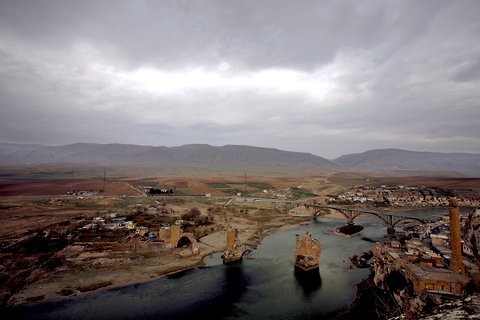I am thankful to Mr. Umaru Abdul Mutallab, the father of the failed Christmas day bomber. In late 2009, Mr. Abdul Mutallab, a Muslim, approached U.S. authorities in his native Nigeria to warn them of his son’s slide into Islamist ideology. Mr. Abdul Mutallab’s altruistic initiative is a case in point about the conflict between Muslims and Islamists.
While Islam is the faith of 1.4 billion people, Islamism is not a form of the Muslim faith or an expression of Muslim piety. Rather, it is a political ideology that strives to derive legitimacy from Islam. Islam and Islamism are not synonymous, and there is even a tension between the two, exemplified by the case of this Nigerian Muslim father turning in his Islamist son to the authorities.
So if Islam is a faith, then what is Islamism? It can be best described as an “anti-” ideology, in the sense that it defines itself only in opposition to things. That is, Islamism stands not for but against.
For starters, Islamism is anti-Semitic in promoting the view that Jews are evil. Because Jews live in Israel, it is also anti-Israeli, and it is also anti-American due to its distorted view of Jews’ role in the United States. “Jews are evil, they run America, therefore America is evil” — this is the mantra of Islamist thinking.
Islamism is also anti-Christian, having a perverted view of the religion as well. And since Jews and Christians live in the West, many Islamists are anti-Western. They likewise oppose liberal democracy and secularism, as these institutions originated in the West.
What is more, Islamists tend to be anti-capitalist because — now you follow the logic — capitalism originates from the West. Many also believe that “Jews invented capitalism” and therefore see capitalism as doubly evil. When they make money, however, Islamists often soften their negative attitude toward capitalism, anti-capitalism being ever the corruptible link in the Islamists’ “anti-” ideology.
Paradoxically, Islamists also consider communism evil — “the Jews invented that as well.” That Karl Marx, who had Jewish grandparents, was raised a secular Protestant is irrelevant to Islamist zealots who find “evil Jews” everywhere. Islamists see Jewishness in all things they dislike politically. Take, for instance, Mustafa Kemal Ataturk, who had no Jewish heritage. Many Islamists, who cannot imagine a genuine Muslim who shares Western values, will tell you he is a crypto-Jew.
Islamism is therefore not about the Islamic faith. Rather, it is a dystopian ideology that distorts religion and reality to fit its “anti-” platform. In fall 2009, in a recent case demonstrating this pattern, Turkish Islamists attended the funeral of Caliph Ertugrul Osman, the descendant of Westernizing Ottoman sultans, lamenting the caliphate as the anti-Western institution par excellence.
Distortedly, these Islamists envisioned Osman, a Scotch-drinking, Wagner-listening, Western Muslim and resident of Upper East Side in New York City, as the leader of their Islamist crusade, arriving at his funeral only to celebrate this delusion.
But perhaps worst of all, Islamists distort their very own religious texts so as to befit this “anti-” platform. Consider the various annotations of the Muslim sacred book, the Koran. The book was originally written in classical Arabic, a rich, sophisticated language with tens of thousands of words and nuances, as well as flowing poetry. Over eighty percent of the world’s Muslims don’t speak or read Arabic, so the book has to be translated, requiring the addition of numerous annotations. These annotations differ depending on the edition of the text. In the case of Islamists, these are the seeds of hatred.
I was raised in Turkey and read the Koran with Turkish annotations. The first time I read an Islamist Koran was when I was 26, living in New York City. Praying at an American mosque, I came across an English-language Koran printed in Saudi Arabia, the main purveyor of Islamist texts worldwide. In its man-made annotations, this Koran preached violence and hatred towards Jews, Christians, the West and Western institutions generally.
In Turkey, the Diyanet, the country’s highest authority for the Muslim faith, prints Korans that are “halal,” i.e., without such hateful annotations. This institution is part of the secular government bureaucracy in Turkey, an ironic fact that is not without good consequences. The Diyanet promotes and protects tolerant Turkish/Balkan Islam, which explains why generations of Turks have grown up in Turkey shunning Islamism. The right Koran can firewall the minds of Muslims against Islamism, and in Turkey, Muslims have thus far won out against the Islamists.
The future of many countries in the world, and the future of the West, will be determined by this battle between Muslims and Islamists. Islamists want to convert Muslims to their hateful ideology. God knows the world needs more Muslims and fewer Islamists.
Soner Cagaptay is a senior fellow and director of the Turkish Research Program at The Washington Institute.


Leave a Reply